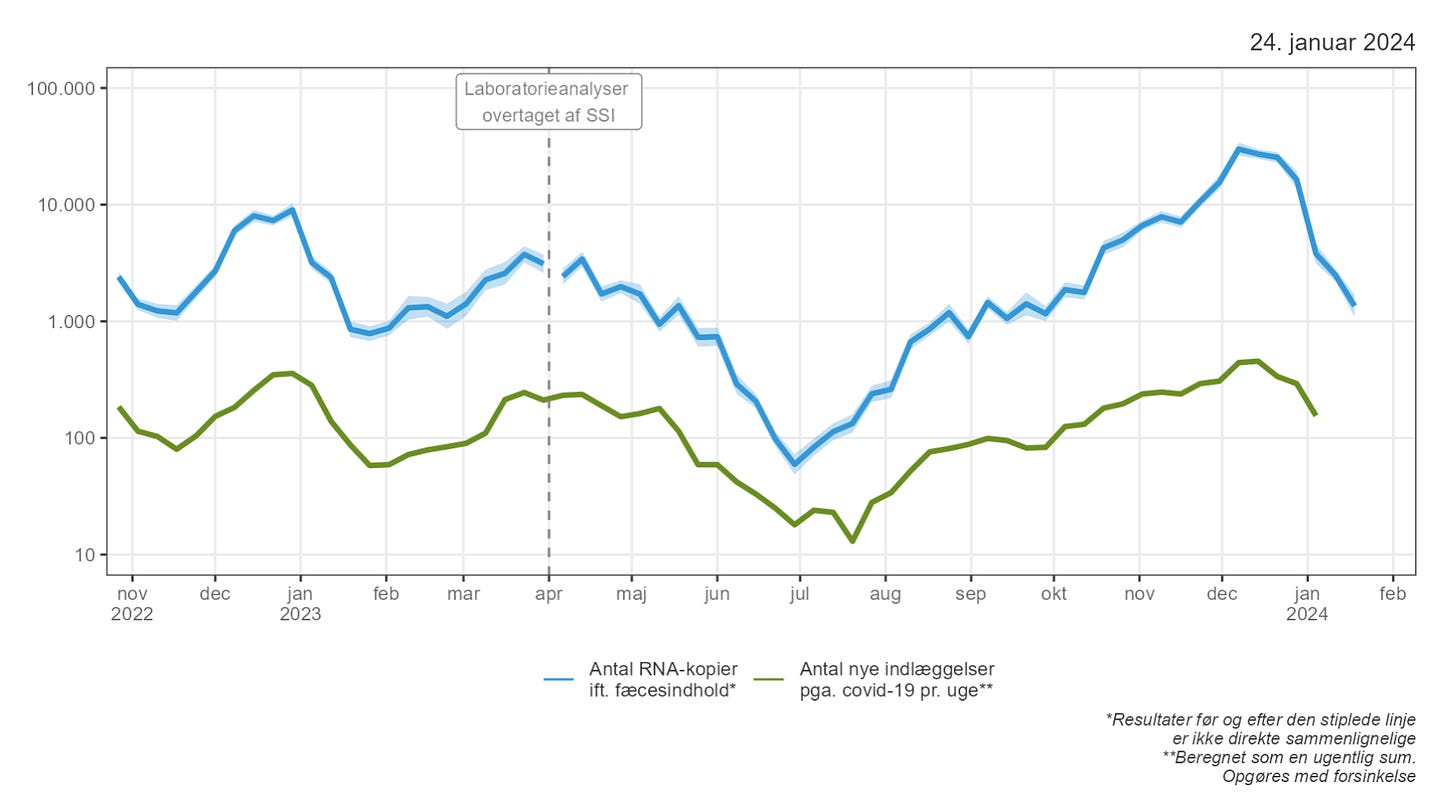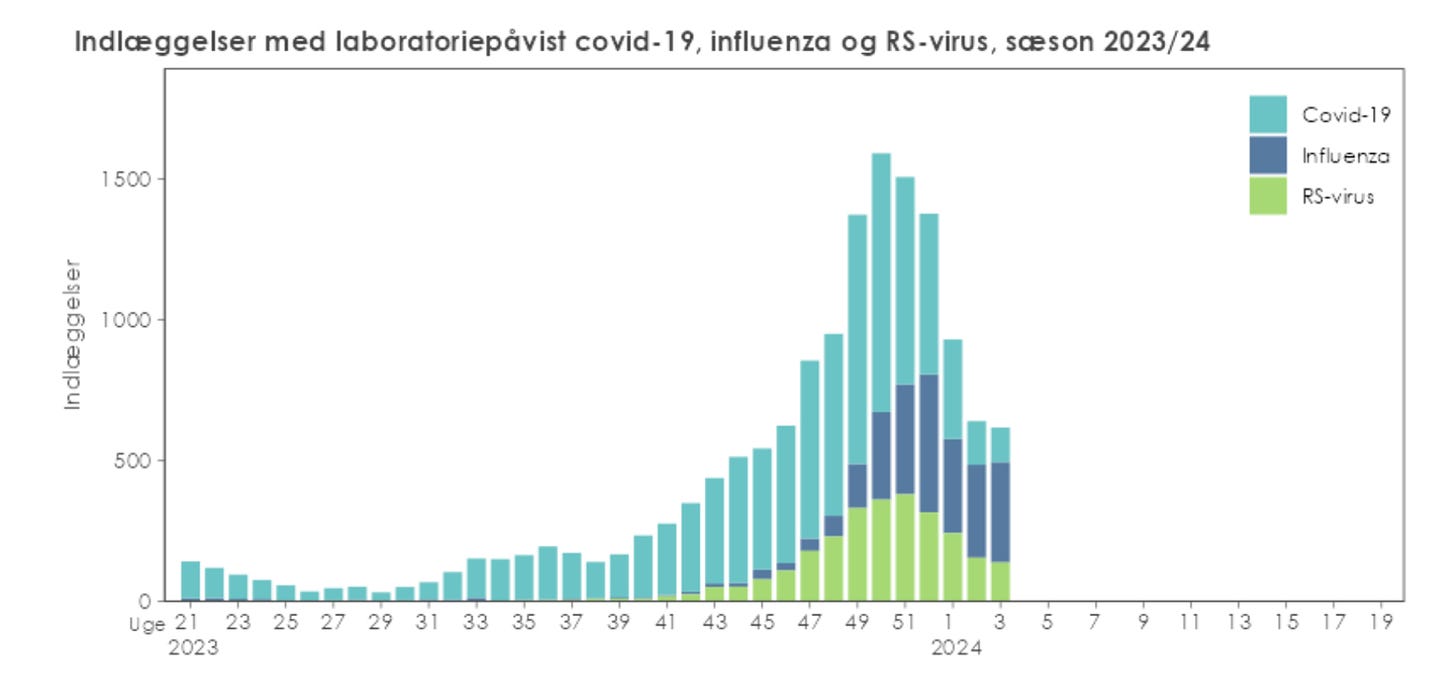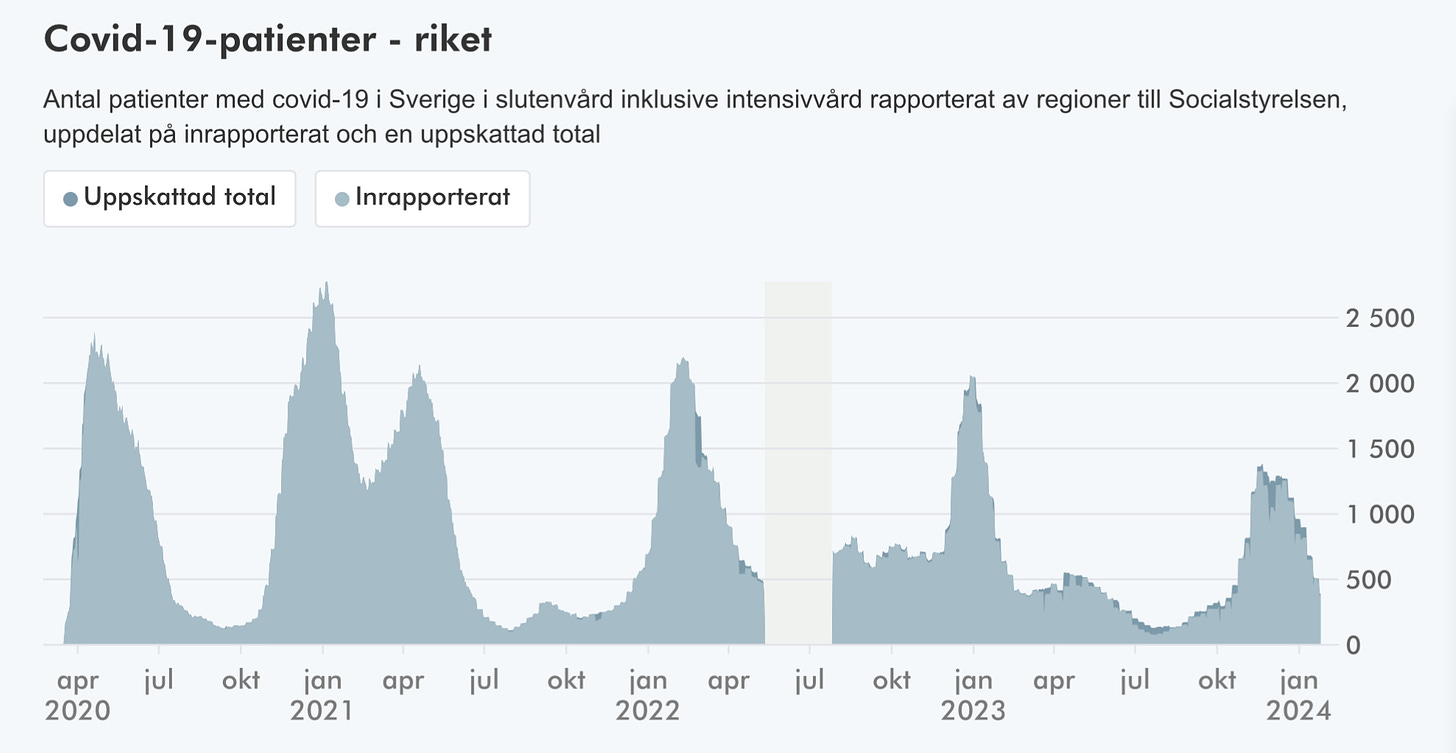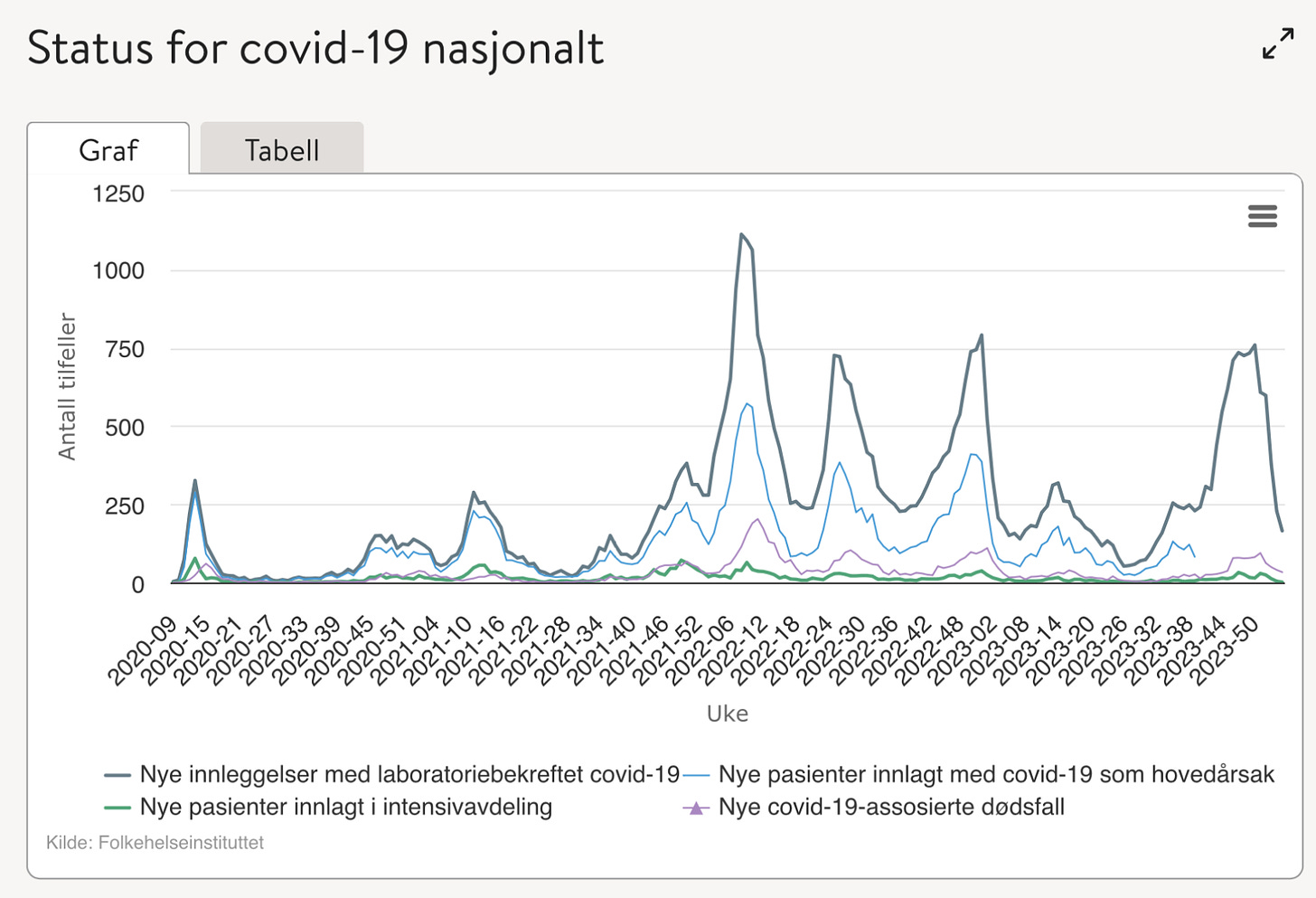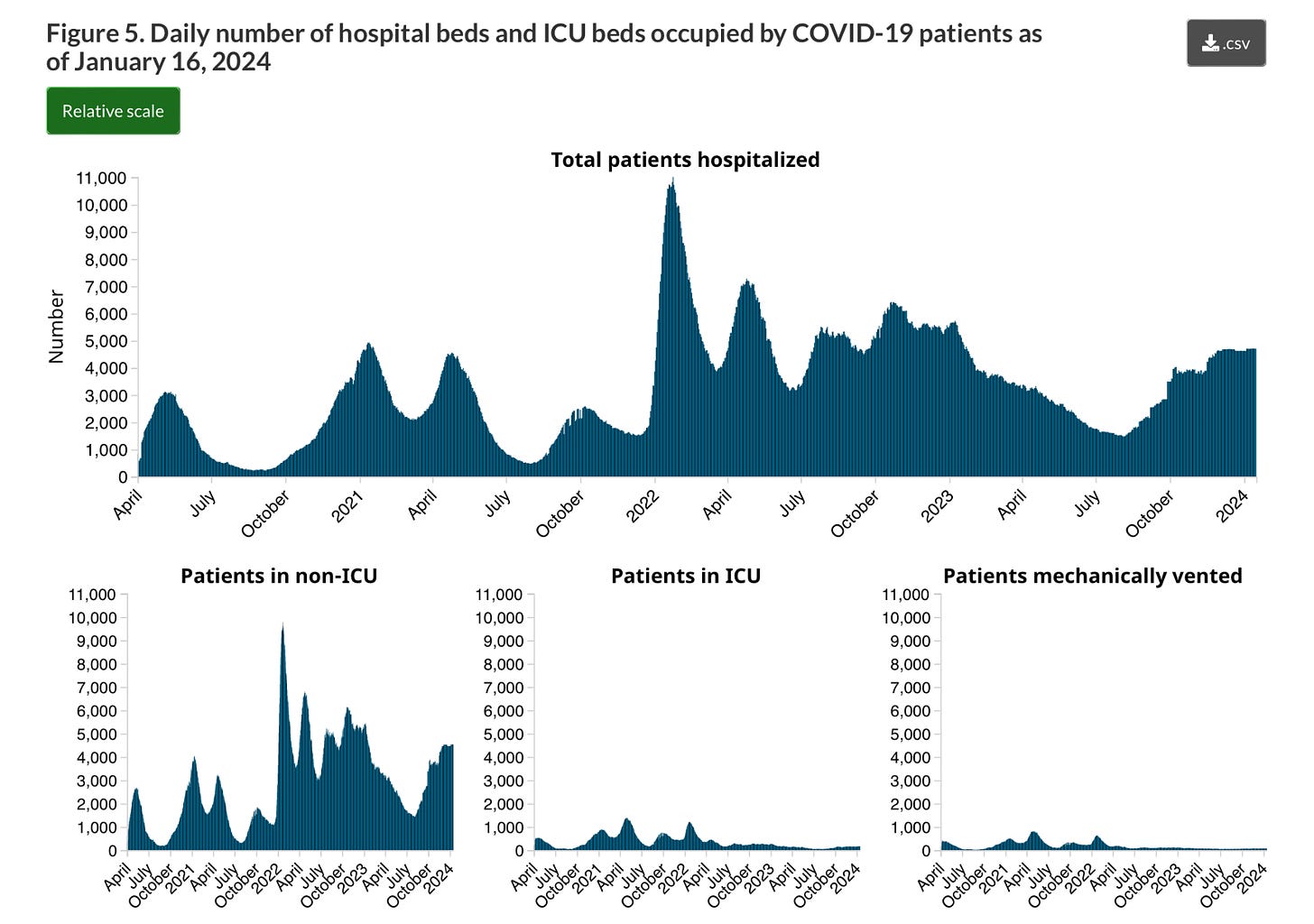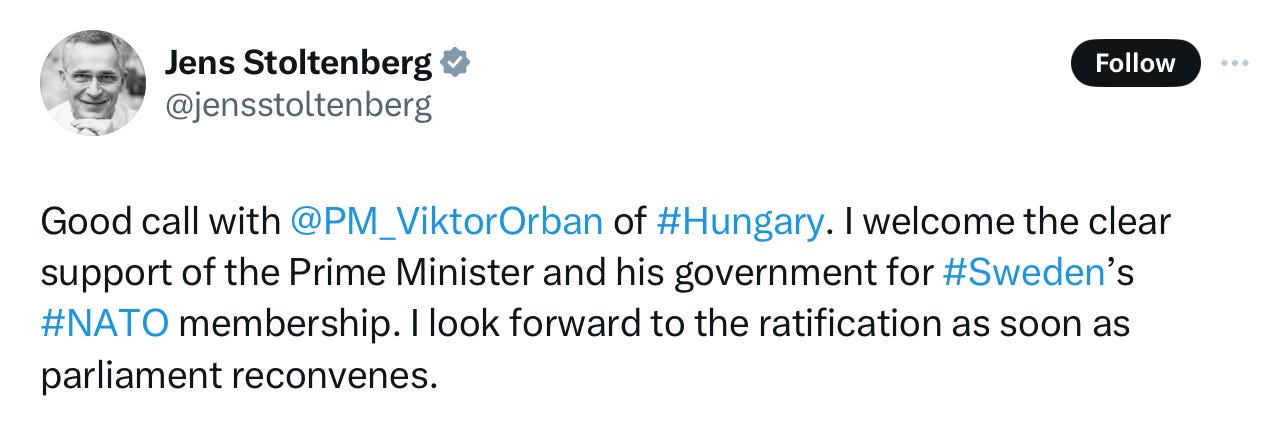🚨Travel Alert🚨
If you are planning to travel by train to Germany this weekend then you might want to make other plans. German train engineers began another round of strike action last night. The engineers plan to stay on the picket lines until at least Monday. That is throwing an absolute wrecking ball through long-distance rail traffic schedules throughout the country. The train engineers have been locked in a labour dispute with the German state railways operator Deutsche Bahn since November.
🍃Environment & Energy⚡️
🇳🇴
Wild salmon stocks in Norway have suffered a sharp decline sparking serious worries in the Nordic nation. An assessment of stocks counted 70,593 fish last year down sharply from the 97,678 counted in 2022. Over the last decade, the number of wild salmon in Norway has been reduced by half.
Norske Lakseelver General Secretary Torfinn Evensen spoke to NRK:
“It is a desperate situation for everyone who cares about Norwegian nature. The fate of the wild salmon is a concrete example of the natural crisis we are in the middle of. It is dramatic. Wild salmon are a living environmental indicator of how we manage our streams and fjords.”
Salmon farming in Norway is getting a major part of the blame. Last year the industry had a banner year with 122 billion (about $15.7 billion Cdn) worth of Norwegian farmed salmon sold.
“Collective research identifies the farmed salmon industry as the biggest threat to wild salmon. The most important thing now is to get control of salmon lice from the farms and escape farmed salmon. If we are to succeed in saving wild salmon in the future, the number of farmed salmon in open facilities must be drastically reduced.”
However, despite the research the aquaculture industry in Norway is steadfast that farmed salmon are not at fault.
🇩🇰 ☔️
As Denmark was hit with torrential rain and raging winds over the last few days parts of the country are again dealing with flooding. In Djursland north of Aarhus, Alling Å (stream in Danish) overflowed its banks flooding parts of a residential area. The municipality had to build an embankment made of soil to keep the flood waters from overrunning the pumping station. The flooding could get worse with more rain in the forecast.
Alling Å is the same stream running just kilometers from the Nordic Water site where emergency responders are working feverishly to keep a landslide of toxic soil away from the waterway.
While some parts of the country deal with more flooding the overall situation isn’t as bad as initially feared. The Danish Meteorological Institute issued flood warnings on Wednesday for a wide swath of the Danish coastline as it forecast ocean waters to surge by almost two meters. But water levels did not end up increasing as much as forecast.
🇸🇪 ☔️
People in Southern Sweden are dealing with the worst flooding in the last 50 years. The epicenter of the flooding is in Hörby in Region Skâne. The Swedish national weather agency, the SMHI, issued an orange weather alert for Skâne that will remain in place through Thursday. But with heavy rain in the forecast tomorrow the flooding situation may actually get worse, which could cause the SMHI to raise its weather alert even further,
🇩🇰
A group comprised of Danish government ministries, municipalities, environmental groups, and industry stakeholders began meeting this week to tackle the issue of reducing agricultural CO2 emissions. The purpose of the meetings is to find broad-based and long-term solutions to the agricultural sector's climate and nature challenges. One of the most contentious issues on the table is a climate tax on agriculture. Another thorny issue is nitrogen in fertilizers leaking into waterways from nearby agricultural lands.
The Kattegat, the waterway between Sweden and Denmark that links the Baltic and North Seas, suffered a serious oxygen loss last fall due in large part to nitrogen pollution. Oxygen levels were so low that some invertebrate species were all but wiped out while fish and other aquatic life fled the Kattegat almost entirely.
-
Denmark’s state auditor has delivered a sharp rebuke to the Danish Ministry of Defense. An audit found that the ministry does not have a contingency plan for how to handle large oil and chemical spills at sea. It say the ministry’s marine environment response falls short of what is required by the Marine Environment Act. The six auditors concluded that the ministry does not have sufficient capacity or ability to mount a rapid response to a major spill. It also determined that special environmental response vessels are plagued with problems and mechanical breakdowns. So much so that 43% of the fleet was unavailable in the last five years should there have been a major spill. The auditors described their findings as “disturbing.”
-
The Danish government will pass a bill that will allow people living in homes close to a large wind turbine test center in Østerild in Thy on Jutland’s west coast to stay in their homes. Some homeowners were facing expropriation as Denmark mulls whether to expand the existing test center or build a new one in farther south in the Wadden Sea. The existing law states that no one can live in a radius equal to four times the height of a wind turbine. If the existing wind turbine test center is expanded new taller turbines would be set up pushing the existing exclusion past existing homes. The exemption in Thy will likely be passed by parliament by February 1.
However, critics say the move is a dirty trick by the government to get an expansion built without all the bad press of forcing people from their homes.
Neighbours fighting against the expansion of the testing center say the turbines are impacting their health as the noise causes loss of sleep, stress, and other psychological issues.
🇪🇺
It isn’t just Denmark, the European Union has begun the thorny job of beginning what it called a ‘strategic dialogue’ with farmers over agricultural CO2 emissions. EU Commission President Ursula von der Leyen says that farmers and politicians must come together to “find a new way forward.” She highlighted the need to help combat “the increasing division and polarization” polluting the conversation. Upset farmers and agricultural groups have already staged angry demonstrations in Belgium, France, Germany, and Romania.
🇫🇮
A majority of people in Finland are in favour of capping spot electricity prices according to a new poll. The poll was conducted by Maaseudun Tulevaisuus. Unsurprisingly, low-income earners were the most likely to be in favour of a price cap.
Finnish Energy is not a fan of the idea saying that it would lead to a decrease in production and the possibility of electricity supply falling short of demand. It also adds that Finland has the second lowest electricity prices in Europe.
🇩🇪 🇮🇹
The German government has thrown its support behind a plan to build a number of large-scale gas-fired, hydrogen-ready, power plants around the country. Germany has been accelerating its transition away from coal and nuclear energy, minus a few hiccups like the energy crisis and a massive drought years ago.
The plan aims to complete the construction of a number of these power plants across the country by 2030. That is a significant moving up of the goal past of 2038 that was initially announced. The first tenders should be tabled this year.
It won’t be cheap coming with a near €40 billion price tag.
To be truly efficient the majority of these plants will need to be run on hydrogen. That is where Italy enters the picture. The two countries are negotiating the building of a hydrogen corridor from North Africa through Italy and over to Germany.
By 2045 Germany intends to reduce its energy imports to 30% of its demand.
🦠COVID🦠
🌎 🦠
As COVID continues to evolve and spread the World Health Organization is issuing a warning to world leaders about ‘Disease X’. That is the name it has given to a hypothetical future virus that could trigger a global pandemic. The WHO says without preparation a ‘Disease X’ pandemic could be exponentially worse than what we saw with the coronavirus.
In a meeting held last week, Scientists from the WHO appealed to world leaders to develop pandemic response and prevention strategies to deal with a future ‘Disease X’ pandemic.
As for what this ‘Disease X’ might be the scientists don’t know but high on their worry list is an as-yet unknown respiratory virus that may already be circulating and evolving among animals that hasn’t yet made the jump to humans.
The WHO also warned that much more effective communication strategies are needed to reduce the disinformation and conspiracy theories that were spread during the COVID pandemic. Ironically, some social media accounts were already accusing the WHO meeting itself of being a conspiracy.
🇩🇰
With Denmark’s COVID and influenza fall and winter vaccination program coming to an end earlier this month preparations are already underway for the next campaign. The country’s pharmacists and Region Syddanmark would like to see a major change in that future vaccination campaigns be communicated more clearly and that plans are shared well in advance. They say that there was only three weeks advance notice before the Ministry of Health launched last fall’s inoculation effort. The short deadline made it nearly impossible to get enough staff hired or to get IT systems up and running in time.
Region Southern Denmark CEO Kurt Espersen:
“It is also crucial both for us and those we collaborate with regarding the vaccination program that the national health authorities give us a notification as soon as possible if we are to tackle this task effectively again this year. In this way, we get as much time for planning and any possible tenders as possible.”
-
That said, Region Syddanmark says it is happy with how things went with this winter’s vaccination campaign. It says the combined uptake for a COVID booster and a flu shot was 77%, which is the national average. Among seniors in care homes across the region, 86% had both inoculations.
CEO Kurt Espersen:
“Our organization with regional vaccination centers and the agreement with the pharmacies has, despite some criticism at the start, proved to give a really good result. I note at the same time that the results across all five regions are very similar, and this nicely supports the expectation of a large turnout that we had when the vaccination effort started in the autumn.”
In its post mortem, the region says pharmacists ended up administering the most vaccinations with 60% of all doses given happening at a pharmacy in the region. It also noticed that demand was front-end loaded meaning a big crowd at first with interest tapering off over the winter.
-
The Statens Serum Institute says a “strong decrease” in COVID activity (blue line) and infection-related hospitalizations (green line) continues across the country. That is according to the latest results from COVID wastewater surveillance.
The SSI says that confirmed coronavirus infections (an unreliable statistic) and COVID hospitalizations have been falling for five consecutive weeks.
There are now more influenza-related hospitalizations than admissions for either COVID or the RS virus.
The institute says while overall influenza cases have continued to decline, albeit at a much slower rate in the last week or two, the number of influenza A strain cases is on the rise.
The good news continues across the board with infection numbers and hospitalizations also on the decline for both the RS virus and whooping cough.
-
A new Danish study has disproven some COVID pandemic misinformation. The myth being spread a few years ago was that there were so-called faulty vaccine batches or ‘hot lots’ supposedly causing a higher risk of adverse effects. The preprint study from the Statens Serum Institute did a nation-wide study specifically focused on different batches of COVID vaccine and found nothing to support the claim of bad batches.
SSI Head of Epidemiological Research Anders Hviid:
“We conducted a nationwide cohort study in Denmark, examining the safety of different batches of the BNT162b2 mRNA COVID-19 vaccine. We evaluated 27 serious adverse events, two negative control outcomes, and all-cause mortality within 28 days post-vaccination in two studies. The result is we found no robust associations between pre-specififed "hot lots" and serious adverse events.”
The study can be found HERE.
🇸🇪
COVID hospitalizations in Sweden (390) continue to fall (-119) while the number of people needing intensive care (5) has also dropped (-3).
-
The Swedish Public Health Agency says all the COVID indicators seem to show the winter infection wave is receding. Hospitalizations, confirmed cases, and infection-related deaths have all “decreased in recent weeks.” Even the positivity percentage has fallen to 11%, down three points week to week.
That said, Sweden continues to see a significant number of COVID deaths with another 304 lives lost in the last three weeks, although deaths decreased from 128 to 64 from one week to the next. Sweden has averaged 138 virus deaths in recent weeks. 65% of those lost lives were seniors over 80.
The BA.2.86 variant and more specifically its JN.1 sub-variant remain dominant in Sweden.
🇳🇴
Respiratory infection indicators in Norway seem to indicate an almost across-the-board resurgence. The Norwegian Institute of Health says while influenza rates are relatively stable indicators point to a new infection increase. It adds that the winter COVID wave is returning and RS virus cases are on the rise.
COVID hospitalizations (165) are down (-63) while intensive care admissions (1) also ebbed (-3). The health institute cautions that some hospitals haven’t reported meaning the numbers are not 100% accurate.
There is a bit of a lag in fatality data. There were 40 lives lost in Norway in the second week of January slightly down from the 39 deaths in the previous week. The NIPH advises caution with fatality numbers due to a data issue.
As is the case elsewhere in the Nordics the JN.1 variant is dominant in Norway.
On the influenza front, the health agency says flu cases seem to have peaked over Christmas barring another spike. But it adds the decrease in flu cases seen in past weeks has now leveled off with indicators showing a new rise in infection activity. Flu-related hospitalizations also declined. Norway continues to see two flu strains breaking out simultaneously.
RS virus cases are rising, as is the positivity percentage, and hospital admissions.
🇨🇦
COVID infections continue to exert a lot of pressure on hospitals across the country. In the week ending January 16, there were 4,706 total beds in use by infected patients across Canada, which is one more than the previous week. General admissions increased by three to 4,535. The number of people needing intensive care fell slightly to 171, two fewer than the week before. There were 73 severely infected people requiring a ventilator, which is one less compared to the previous week.
In its latest weekly update, the Public Health Agency of Canada says another 125 lives were lost to the virus pushing the pandemic death toll to 57,711.
The seven-day positivity percentage is 13%.
🇺🇦/ 🇷🇺 War
🇭🇺/ 🇸🇪 NATO
With all eyes now on Hungary, NATO Secretary General Jens Stoltenberg wasted no time in getting Hungarian Prime Minister Viktor Orbán on the phone.
In response, Orbán released a statement saying that he confirmed to Stoltenberg that the Hungarian government supports Swedish membership in NATO. He added that he would ask the Hungarian National Assembly to vote on and approve Sweden's NATO membership as soon as possible. Hungary’s parliament is scheduled to begin its next sitting at the end of February but Prime Minister Orbán also has the power to recall the parliament before then. .
Like Turkey, Hungary has blocked Sweden from becoming a member of the defense alliance since the spring of 2022. But unlike Turkey, Hungary has nothing to bargain with and has made no demands of Sweden other than to jump on the Turkish bandwagon to make brass and often contradictory declarations.
This week, Orbán invited Sweden’s Prime Minister to Hungary for talks on the country’s NATO application. The invitation had a cool reception in Sweden and was quickly upstaged by the sudden Turkish ratification vote.
Hungary is now the only one of NATO’s 31 member nations that has yet to ratify Sweden’s NATO application.
🇹🇷 🇸🇪
Turkish President Recep Tayyip Erdoğan has officially signed off on the ratification vote on Sweden’s NATO membership that passed the Turkish parliament on Tuesday.
Swedish Defense Minister Pål Jonson:
“Through President Erdoğan's signature, the Turkish decision-making process is now complete, which is very gratifying. Now only Hungary's ratification remains before Sweden becomes a full member of NATO.”
🇸🇪 🇭🇺
Swedish Prime Minister Ulf Kristersson has accepted Hungarian Prime Minister Viktor Orbán’s invitation to meet to discuss Sweden’s NATO membership. Kristersson said he is happy to meet in Budapest or at next month’s European Council meetings.
Orbán mentioned negotiations in a social media post about the invitation that came the day before Turkey’s surprise ratification vote. What those negotiations would be about is a mystery as Hungary has made no demands of Sweden. And Orbán himself confirmed after Turkey’s vote he supports Sweden joining NATO had that his parliament should hold a vote as soon as possible.
Sweden’s Foreign Affairs Minister Tobias Billström also dismissed any negotiation when speaking to reporters.
“I see no reason to negotiate in this situation.”
NATO 🇺🇦
NATO has signed a $1.2 billion (U.S.) contract for artillery ammunition to both replenish domestic stockpiles but also to ensure a reliable flow of ammunition to Ukraine.
NATO's Secretary General, Jens Stoltenberg says increasing the production of ammunition is an "absolute necessity" in order to continue supporting Ukraine in the war against Russia.
“This demonstrates that NATO’s tried and tested structures for joint procurement are delivering. Russia’s war in Ukraine has become a battle for ammunition, so it is important that Allies refill their own stocks, as we continue to support Ukraine.”
NATO has not yet announced who will deliver the ammunition.
Since July of last year, NATO has signed contracts for $10 billion worth of artillery and ammunition and missiles.
🇸🇪/ 🇷🇺
Russian hackers have intensified cyber attacks on Sweden. An IT system handling the wages of some 60,000 government employees is the latest to be hit. The attack paralyzed parts of the system leaving behind a mess to untangle that is impacting, among other things, sickness absences and holiday requests from movie theatres to government agencies. It wasn’t just the IT company, Tietovery, that was impacted but also other private companies, municipalities, and regions. The company told Sweden’s Dagbladet that a Russian hacker group called Akira is behind the ransomware attack.
🇱🇻🇪🇺🇺🇦/ 🇷🇺
Latvia’s Foreign Affairs Minister Krǐsjānis Kariňs is hailing a revamped EU military fund for Ukraine. The European Union military assistance fund will have an annual budget of €5 billion as the EU transitions from providing Ukraine with weapons from existing stockpiles to procuring them directly from the defense industry.
In fine Latvian fashion Kariňs didn’t beat around the bush about why the fund is needed and why Russia must be stopped.
“Three words. Peace through strength. I think we have to open up our eyes and realize that Russia will not stop its war in Ukraine. The only way Russia will stop is if it is actively stopped. And the Ukrainians are willing to put up the fight. The Ukrainians need our Western undivided support, European Union support. So we have to come finally to the decision to make sure that we have the funding for Ukraine for the coming years so that they can continue to sustain their government. And we also have to make sure that we provide the weapons and the ammunition that they need in order to do this task. For anyone who thinks it is expensive to support Ukraine and that this money is better spent elsewhere I can only say it will only get more expensive in the future. If we don’t help Ukraine stop Russia now it will only be all the more expensive for us later because Russia will not stop it can only be stopped.”
Hungary had been blocking the creation of the fund but dropped its opposition earlier this week.
🇬🇧
The United Kingdom continues to support Ukraine and says it will continue to do so for “as long as it takes”. Backing that pledge up the British government has increased military aid to Ukraine to £2.5 billion for this year. The news was announced by Defense Secretary Grant Shapps at the 50-nation-strong Ukraine Defense Contact Group meetings this week. Shapps urged other nations to also step up and increase military aid to Ukraine.
🇩🇰 🇨🇿 🇺🇦
Denmark and the Czech Republic have signed a memorandum of understanding to work closer together to secure high-quality weapons and military equipment for Ukraine and get them delivered as quickly as possible.
Danish Defense Minister Troels Lund Poulsen:
“We have already sent significant military donations to Ukraine in cooperation with the Czech Republic. Donations that Ukrainians desperately need. With this agreement, we emphasize the good cooperation with the Czechs and at the same time create a framework for more donations via the Czech Republic.”
This is not the first time these two countries have worked together to get weapons to Ukraine. This agreement will follow the model laid out in previous partnerships where Denmark will transfer funds to the Czech Republic, which then handles the weapons and equipment contracts, checks each shipment, and ensures it gets delivered.
Czech Deputy Minister of Defense, Daniel Blažkovec:
“A close bilateral cooperation between the Czech Republic and Denmark is a significant step towards ensuring an uninterrupted flow of military assistance to Ukraine. The cooperation addresses Ukraine's current urgent needs and at the same time contributes to the transformation of the Ukrainian armed forces towards our common NATO standards, all the while giving Ukraine technological superiority on the battlefield.”
🇩🇰
The Danish Armed Forces will soon launch a large public relations campaign across all platforms from videos to newsletters, and social media, to encourage people to enlist and to retain those already serving. The 12.9 million Danish kroner (about $2.5 million Cdn) PR campaign will run for a ten-week period and be built around the tagline “What we take care of is worth it all”.
The Danish Armed Forces are facing a serious manpower issue exacerbated by the current security situation where the possibility of war is growing. About 20,000 people are serving in the armed forces with a growing number leaving each year.
Denmark, like other European countries, is investing serious money in scaling its military back up to face the potential threat of war with Russia. As part of that effort, it is also looking at every option to increase the size of its army including reassessing conscription.
🇩🇰 🇺🇦
Modern wars are not just fought on the battlefield. Denmark is donating 91 million Danish kroner (about $17.9 million Cdn) to Ukraine to beef up its defenses against cyber attacks.
Defense Minister Troels Lund Poulsen:
“We have delivered several donations that support cyber defense and the critical IT infrastructure in Ukraine. It is therefore also natural that we contribute to the support of Ukraine in an area where we are already active.”
-
War fatigue appears to have set in across Denmark. The country’s national broadcaster DR spoke to a number of aid agencies all of whom said that donations that used to pour in to help Ukraine have now slowed to a trickle. Organizations that send everything from used cars, emergency aid, lighting for trenches, hospital equipment, and hygiene products, all have noticed either fewer overall donations or those donations have shifted from individuals to companies.
Aarhus University Political Science Professor Michael Bang Petersen told DR that with the war dragging on people’s interest has shifted to other issues. He says it is not unlike the COVID pandemic when people were initially very invested in every bit of pandemic information but as the pandemic dragged on that interest eventually dwindled.
“It is no longer an acute crisis that requires a popular contribution, but more of a protracted conflict that requires normal aid agencies, including the state, to take over. You feel, so to speak, that it has become more the state's responsibility rather than your personal responsibility.”
According to the United Nations, the war in Ukraine has cost more than 10,200 civilian lives, including 575 children, since Russia invaded.
🇫🇮/ 🇷🇺
More undocumented migrants are crossing the border from Russia into Finland. The Finnish Border Guard caught another group of 18 migrants, including children, that crossed the border illegally near the town of Imatra. All immediately applied for asylum.
Commander of the North Karelia Border District Matti Pitkäniitty:
“Sharp increase in illegal border crossings at Finnish-Russian land border. In Southeast Finland. Since the New Year three groups totaling over 30 persons have crossed this border illegally, despite the harsh conditions of snow, subzero temperatures, and short days.”
The Finnish land border with Russia remains closed as Russia weaponizes immigration directing undocumented migrants through Russia to the Finnish border.
🇵🇱🇱🇻🇱🇹🇪🇪/ 🇷🇺
Poland and the three Baltic states, which continue to be the fiercest opponents of Russia within the EU, are proposing a ban on all Russian LNG and aluminum in the next round of European sanctions. Not done there, they would also like all scientific cooperation and joint scientific research with Russia suspended. This is on top of other proposals to combat Russia’s attempts to circumvent sanctions, toughen restrictions on the aviation sector, and a ban on all products going to Russia that could be used for the production of drones.
🇸🇪
The Swedish chocolate brand Marabou, owned by Mondelez International, has been stripped of the title of ‘Supplier to the Royal Court’ by the Swedish Royal Family. Last year, Mondelez was blacklisted by Ukraine as supporting Russia’s war effort in Ukraine by continuing to sell its products in Russia. Scandinavian airlines SAS also stopped selling Mondelez products, which include Marabou, Daim, and Orea, due to its continued business in Russia.
🇨🇦 🇺🇦
Canada has donated 10 multirole boats from Zodiac Hurricanes Technologies to Ukraine. The value of the boats is an estimated $20 million. The rigid hull inflatable crafts will come with sophisticated sensors, navigation, and communications systems. Also included are trailers, spare parts, and training for Ukrainian troops. The boats are expected to be delivered by late spring this year.
Canada will also contribute training instructors, planes, and support staff to the F-16 coalition that is working to modernize Ukraine’s Soviet-era Air Force. Training will begin next month and last through next year. Also being thrown in is English language training for Ukrainian Air Force personnel, which is a requirement in taking part in the F-16 training program.
Odds & Ends
🇩🇰
Spring is coming…eventually…and with it will come allergy season. If you have severe allergies and have been vaccinated against grass or pollen allergies but got the jab more than five years ago you are no longer protected. That is the result of a study from the Danish Statens Serum Institute that found allergy vaccines are only effective for a five-year period.
SSI Researcher and Study Lead Peter Bager says this is the first study of its kind.
“We are the first to demonstrate that the effect in relation to allergy medication does not continue beyond the five years.”
-
Non-alcoholic beer is growing in popularity in Denmark. People in the Nordic country downed 8.3 million liters of alcohol-free beer last year. That is an 11.5% increase from 2022 according to the Danish Brewery Association. Another sign of increased interest is that the variety of Non-alcoholic beer is also growing with 68 different varieties currently on offer.
-
About 25,000 turkeys at a bird farm in western Sjælland will have to be destroyed after the birds were found to have a highly pathogenic bird flu. The Danish Veterinary and Food Administration says this is the first case of bird flu detected among farmed birds in Denmark this year. It says the culling of the turkeys began on Thursday. A surveillance zone will also be set up around the farm. The bird flu rarely infects humans but it is deadly for birds.
-
Denmark’s national debt is the lowest it has been in the last 25 years according to Danmarks Nationalbank. The debt currently stands at 294 billion Danish kroner, almost 29 billion kroner less than it was in January of 2023.
Danske Business Senior Economist Kristian Skriver told Ritzau that the economic conditions in Denmark are really good right now.
“We are in a place where years ago we probably never imagined we would end up, and this is an expression of the fact that the public finances are healthy and doing very well.”
In the EU, only Estonia, Bulgaria, and Luxembourg have a lower national debt.




